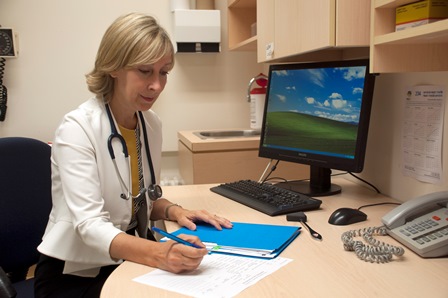This fall, the Montreal Neurological Institute and Hospital (The Neuro, at McGill University and the McGill University Health Centre) expects to introduce a previously unavailable form of treatment for Parkinson’s disease patients. Although the treatment will be limited to patients who fulfill specific criteria, the treatment has been shown to be effective in Europe, where it has been available for more than a decade.
The treatment involves administering the drug Duodopa (a combination of levodopa and carbidopa) directly into the patient’s small intestine via the stomach through a tube. The drug’s dosage is controlled by a mini-pump weighing about half a kilogram that the patient wears at the waist. The body transforms levodopa to dopamine to increase the amount of dopamine in the brain. Parkinson’s disease symptoms are linked to dopamine levels. Carbidopa helps to guide levodopa to the brain and also helps to avoid stomach upset and other undesirable side effects of levodopa.
MORE: RESEARCH MAY LEAD TO FASTER DIAGNOSIS OF PTSD
“The benefit of the Duodopa treatment is that the patient gets the drug continuously and so avoids the kinds of fluctuations that can come when drugs are taken orally at intervals during the day. Some patients have difficulty swallowing, and with this treatment, there’s no need to swallow,” says Dr. Anne-Louise Lafontaine, a neurologist and Director at The Neuro’s Movement Disorder Clinic.
Not all Parkinson’s disease patients will qualify for the treatment.
“Candidates must still respond to levodopa but show that the effect of the drug does not last long, which leads to fluctuations in their symptoms. Some people take a dose and a couple of hours later, they need another dose. Taking a dose six or seven times a day or even more often is not practical or feasible.”
Candidates will usually be under 70 years of age, be in good general health, and have had no major surgery on the stomach. Patients who think that they qualify should ask their doctor for a referral to a neurologist specially trained to administer Duodopa. Quebec’s health ministry will reimburse patients for the treatment only in cases where a neurologist specializing in Duodopa has recommended it.
MORE: GETTING AMBULANCES BACK ON THE ROAD
Patient candidates will begin their regimen initially as in-house patients.
“They will have a three-day tryout to see how they react to a continuous infusion of Duodopa,” says Dr. Lafontaine. “At first, they will not get the dose through the stomach but through a tube in the nose. If it works out, then the dose can be administered through the stomach. The patient will probably stay in the hospital for another two or three days while a neurologist and a nurse check to find the proper dosage. Once the rate is set, there’s not much fiddling with it. The examples in Europe show that the set rate seems to remain quite stable.”
Patients will use the mini-pump to administer the drug into the body for 16 hours a day. At night, the treatment is stopped, but the hope is that the brain can store enough dopamine during the day to last overnight.
Dr. Lafontaine sees Duodopa as an alternative or complementary treatment to Deep Brain Stimulation (DBS). DBS involves surgically implanting a pacemaker in the brain. The pacemaker sends electric impulses to parts of the brain, which act to control Parkinson’s disease symptoms such as dyskinesia, tremors and dystonia.
“Duodopa could be used to treat an older group of patients who are not fit for DBS, and also some younger patients who just might not be ready for surgery,” says Dr. Lafontaine. “Some patients might want to try Duodopa for several years and then undergo DBS.”
MORE: STUDY AIMS TO LEARN MORE ABOUT TYPE 1 DIABETES
Dr. Lafontaine acknowledges that Duodopa does not make all Parkinson’s disease symptoms disappear.
“Duodopa doesn’t necessarily address tremor, but “off” time and dyskinesia is significantly reduced.”
The Neuro treats about one thousand Parkinson’s disease out-patients. As the percentage of Quebec’s elderly population increases, the number of patients with Parkinson’s disease is expected to increase proportionately. Unfortunately, because Duodopa treatment is labour intensive, only a relatively small number of patients will be able to receive it.
“We hope to have our first Duodopa patient in the fall, and then expect to have about ten patients a year. That compares to about 15 or so cases of patients at The Neuro who undergo DBS.”
Dr. Lafontaine foresees a time when the criteria for qualifying for Duodopa treatment might be broadened. “We used to offer DBS only to the most severely affected patients, but now the literature shows that there might be advantages to doing it earlier before there are advanced fluctuations. So DBS might stabilize them earlier on. It’s possible that with Duodopa, you might not have to wait until a patient is taking medication every few hours. I don’t know the future, but the bar might move one day to include more patients.”
This article was submitted by Neuro staff


